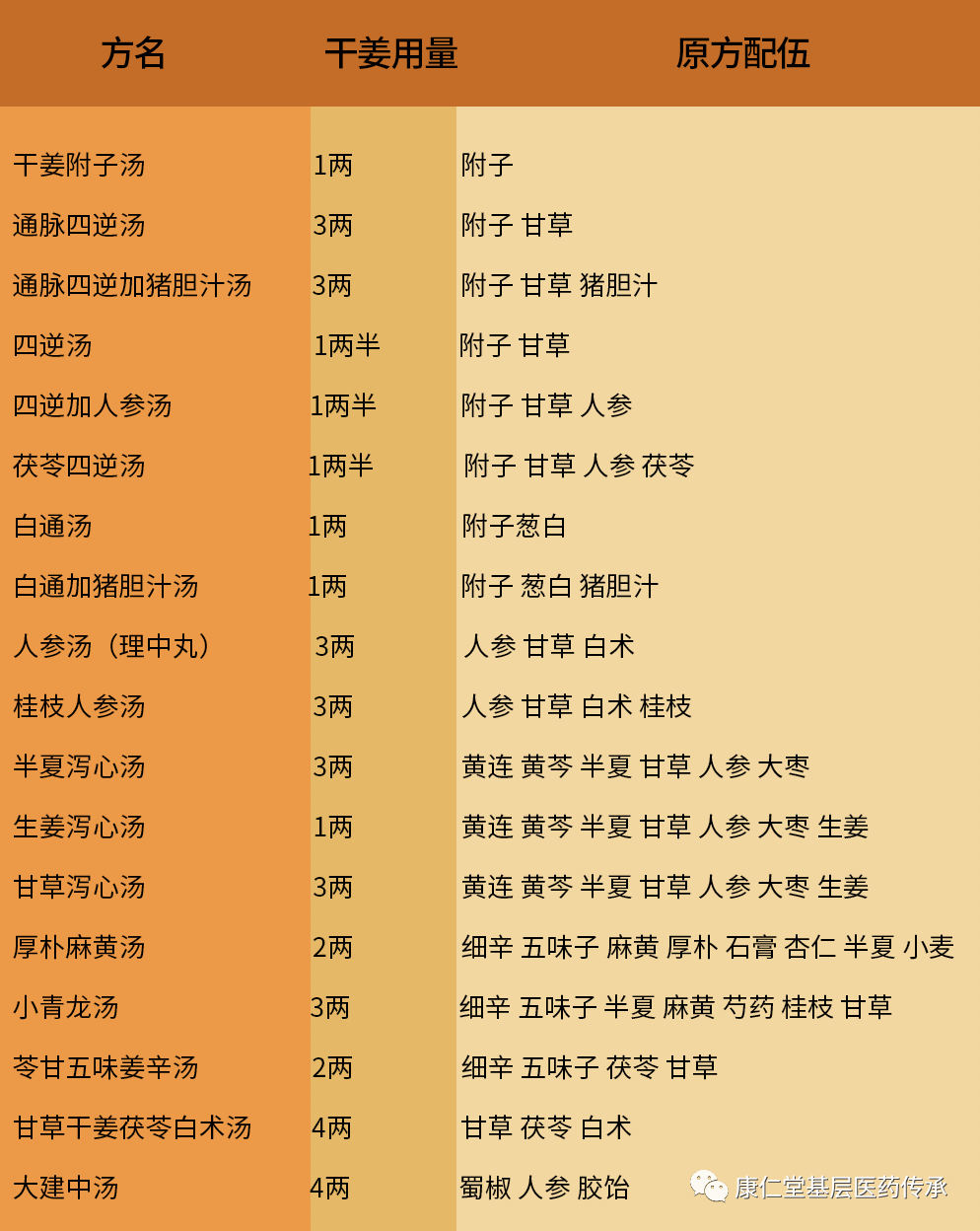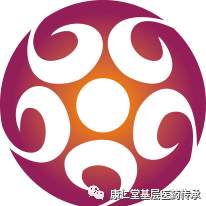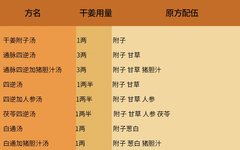Gan Jiang (Dried Ginger) is the dried rhizome of the ginger plant, primarily produced in Sichuan and Hunan provinces. In ancient times, the variety from Junzhou (now Danjiangkou City, Hubei Province) was regarded as a genuine medicinal material, known as Jun Jiang. Currently, the variety from Qianwei County, Sichuan, is considered superior due to its large, plump roots, thin skin, and white, powdery flesh, referred to as Chuan Gan Jiang. The Shen Nong Ben Cao Jing states that Gan Jiang is used to treat “chest fullness, cough, reverse qi, warm the middle, stop bleeding, induce sweating, expel wind-dampness, and relieve intestinal diarrhea.” It appears in 24 formulas in the Shang Han Lun and 32 formulas in the Jin Gui Yao Lue.
Textual Research
Simple Formulas (2 Ingredients): Gan Cao Gan Jiang Tang, Zhi Zi Gan Jiang Tang, Gan Jiang Fu Zi Tang, Ban Xia Gan Jiang San.
Gan Cao Gan Jiang Tang treats “lung atrophy with foamy sputum but no cough.” How does one contract lung atrophy? The Jin Gui Yao Lue states: “It may be due to sweating, vomiting, or from thirst, with frequent urination, or from constipation, or from taking purgatives, leading to a loss of body fluids, hence the condition.” What are the clinical manifestations? “The person is not thirsty, must urinate frequently, and has excessive salivation” (7). Additionally, this formula also treats “dry throat, irritability, and vomiting” (29).
Zhi Zi Gan Jiang Tang treats “after severe diarrhea, if the body heat does not dissipate and there is slight irritability” (80).
Gan Jiang Fu Zi Tang treats “after diarrhea, if sweating recurs, causing daytime irritability and sleeplessness, but calm at night, no vomiting, no thirst, and no exterior symptoms. The pulse is deep and weak, and there is no significant fever” (61).
The above three formulas primarily treat symptoms following severe diarrhea. They may present with foamy sputum, irritability without thirst, or slight irritability despite heat. The “deep and weak pulse” in Gan Jiang Fu Zi Tang and the “not thirsty” and “excessive salivation” in Gan Cao Gan Jiang Tang are particularly important objective indicators.
Ban Xia Gan Jiang San treats “dry retching and vomiting, with foamy sputum” (17). Foamy sputum refers to clear, thin saliva and phlegm.
Next Simple Formulas (3 Ingredients): Si Ni Tang, Tong Mai Si Ni Tang, Tao Hua Tang, Gan Jiang Ban Xia Ren Shen Wan.
Si Ni Tang and Tong Mai Si Ni Tang are discussed under the section for Fu Zi. Gan Jiang is used with Fu Zi and Gan Cao to treat diarrhea with clear stools, sweating with cold limbs, and a deep and weak pulse.
Tao Hua Tang treats “Shaoyin disease with diarrhea of pus and blood” (306), and “Shaoyin disease… abdominal pain, difficulty urinating, persistent diarrhea with pus and blood” (307). The original symptoms for diarrhea with pus and blood using Gan Jiang and Chi Shi Zhi are unclear.
Gan Jiang Ban Xia Ren Shen Wan treats “persistent vomiting during pregnancy” (20). Ban Xia Gan Jiang primarily treats “dry retching and vomiting, with foamy sputum.”
Maximum Dosage Formula (4 Liang): Gan Cao Gan Jiang Ling Zhu Tang, Da Jian Zhong Tang.
Gan Cao Gan Jiang Ling Zhu Tang uses a high dosage of Gan Jiang and Fu Ling, combined with Gan Cao and Bai Zhu, to treat kidney-related diseases. Symptoms include “heavy body, cold in the lower back, as if sitting in water, resembling a water-like state, not thirsty, and frequent urination” as well as “cold pain below the waist, heavy abdomen like carrying five thousand coins” (11). The characteristics are heaviness of the body, cold in the lower back, and lack of thirst.
Da Jian Zhong Tang combines Gan Jiang with Ren Shen, Shu Jiao, and Jiao Yi to treat “severe cold pain in the chest and abdomen,” with symptoms of “inability to eat or drink due to cold in the abdomen, rising qi causing skin eruptions, and pain throughout the body” (10). This is for cold pain in the abdomen with vomiting. Since it is abdominal cold, there should be no thirst, and symptoms of “not thirsty” and “excessive salivation” are expected.
Modified Formulas: Xiao Chai Hu Tang, Zhen Wu Tang, Li Zhong Tang, Si Ni San.
Xiao Chai Hu Tang includes “if there is a cough, remove Ren Shen, Da Zao, and Sheng Jiang, and add Wu Wei Zi (half a sheng) and Gan Jiang (two liang)” (96). Zhen Wu Tang states “if there is a cough, add Wu Wei Zi (half a sheng), Xi Xin (one liang), and Gan Jiang (one liang)” (82), and “if there is diarrhea, remove Shao Yao and add Gan Jiang (two liang)” (316). Si Ni San states “if there is a cough, add Wu Wei Zi and Gan Jiang (each five fen)” (318). This shows that Gan Jiang is used for cough and diarrhea. When Gan Jiang is included in Chai Hu formulas, it is paired with Wu Wei Zi; in Ma Huang formulas or Fu Zi formulas, it is paired with Xi Xin and Wu Wei Zi, as seen in Zhen Wu Tang and Xiao Qing Long Tang. Li Zhong Tang states “for cold, add Gan Jiang, totaling four liang and half” (386). Where there is cold, there must be no thirst and excessive salivation.
Zhongjing’s Formulas
Gan Jiang, Gan Cao, Fu Zi: Used to treat after vomiting and diarrhea with a deep and weak pulse, and cold limbs. Refer to the section on Fu Zi.
Gan Jiang, Gan Cao, Ren Shen, Bai Zhu: Used to treat persistent diarrhea, with a feeling of fullness and hardness in the chest. This formula is similar to Li Zhong Tang, which treats “after a major illness, with a preference for salivation” (396), and Gui Zhi Ren Shen Tang, which treats “persistent diarrhea” (163).
Gan Jiang, Gan Cao, Ban Xia, Ren Shen, Da Zao, Huang Lian, Huang Qin: Used to treat fullness and discomfort in the chest, dry retching, and diarrhea with irritability. This formula is similar to Ban Xia Xie Xin Tang, which treats fullness in the chest “without pain” (149), Sheng Jiang Xie Xin Tang, which treats “after sweating in cold damage, with disharmony in the stomach, fullness and hardness in the chest, dry retching, and irritability” (157), and Gan Cao Xie Xin Tang, which treats “after cold damage with purging, leading to persistent diarrhea, with thunderous sounds in the abdomen, fullness and hardness in the chest, dry retching, and irritability” (158).
Gan Jiang, Xi Xin, Wu Wei Zi: Used to treat cough and wheezing. This formula is similar to Hou Po Ma Huang Tang, which treats cough with a floating pulse (7), Xiao Qing Long Tang, which treats “cough with reverse qi, unable to lie down” (12), and “cough with slight wheezing” (41), and Ling Gan Wu Wei Jiang Xin Tang, which treats “cough fullness” (12).
Formulas containing Gan Jiang in classical texts are listed in Table 7-1.
Table 7-1 Overview of Classical Formulas Containing Gan Jiang

Medicinal Patterns Elaboration
Gan Jiang is used to treat excessive salivation without thirst.
Salivation refers to saliva and phlegm. Excessive salivation indicates that there is more saliva in the mouth or more phlegm being coughed up. The salivation associated with Gan Jiang is often clear, thin, and transparent, or foamy, with patients typically not feeling thirsty, or if thirsty, they do not drink much. Clinically, these symptoms are often accompanied by a thick white or greasy tongue coating, or a white slippery tongue, which can be referred to as a “Gan Jiang tongue.”
Gan Jiang is used to treat the following conditions associated with excessive salivation without thirst:
1. After repeated use of purgative medications. Mo Meishi’s Jing Fang Li Shi states: “All cases of misusing purgatives should use Gan Jiang.”
2. Gastrointestinal diseases characterized by diarrhea, vomiting, weak pulse, and cold limbs.
3. Respiratory diseases characterized by cough, wheezing, and clear, thin phlegm.
4. Wind-dampness pain, cold pain in the lower back and abdomen, clear and frequent urination, and urinary incontinence.
5. Hemorrhagic diseases with dark bleeding.
Gan Jiang is an ancient hemostatic herb, especially for vomiting blood. The Shen Nong Ben Cao Jing states it “warms the middle and stops bleeding.” The Bei Ji Qian Jin Yao Fang uses Gan Jiang powder for persistent vomiting blood, with a dosage of one qian for children. The Zhi Zhi Fang states that Gan Cao Gan Jiang Tang treats various types of bleeding in men and women. Mr. Zheng Qin’an believes that regardless of the type of bleeding, one should first stop the bleeding, using a large dose of Gan Cao Gan Jiang Tang with Xue Yu Tan, which has been repeatedly effective. Mr. Fan Zhonglin often uses a large dose of Jiang (30g) combined with Fu Zi and Gan Cao to treat metrorrhagia and epistaxis. Mr. Fan Wenhui often uses Fu Zi Li Zhong Tang to treat vomiting blood with a deep pulse and pale tongue.
Zhongjing often combines Gan Jiang with other herbs. Gan Jiang and Gan Cao are used to treat vomiting and diarrhea, with Fu Zi in Si Ni Tang, and with Ren Shen and Bai Zhu in Li Zhong Tang. Gan Jiang is paired with Ban Xia to treat vomiting, with Zhi Zi to treat post-diarrhea heat and irritability, with Gui Zhi to treat abdominal pain, with Fu Zi to treat diarrhea with cold limbs and a weak pulse, with Shu Jiao to treat abdominal fullness and pain, with Chi Shi Zhi to stop diarrhea with pus and blood, with Xi Xin and Wu Wei Zi to treat cough, with Bai Zhu and Fu Ling to treat cold pain in the lower back, with Ren Shen and Ban Xia to treat persistent vomiting, and with Huang Lian and Huang Qin to treat fullness and discomfort in the chest with vomiting and diarrhea. The range of applications is quite broad.
Gan Jiang and Sheng Jiang have similar indications, but traditional experience suggests that Gan Jiang is more stabilizing, while Sheng Jiang disperses. Gan Jiang can return yang, while Sheng Jiang disperses cold. Gan Jiang is often used for abdominal cold and diarrhea, while Sheng Jiang is used for abdominal cold without sweating. Additionally, Gan Jiang excels at stopping diarrhea, while Sheng Jiang excels at stopping vomiting.
Gan Jiang patterns and Fu Zi patterns are similar, but the distinction lies in that Fu Zi patterns are often seen with cardiovascular symptoms, such as a deep and weak pulse, while Gan Jiang patterns are often seen with gastrointestinal symptoms, such as vomiting and a white greasy tongue coating. Fu Zi can stop body pain, while Gan Jiang can relieve abdominal fullness, indicating an internal and external difference.
Commonly Used Formulas
(1) Gan Jiang 10g, Gan Cao 20g (Gan Cao Gan Jiang Tang from Shang Han Lun)
Application: For gastrointestinal diseases presenting with diarrhea, vomiting, or clear watery sputum, and for respiratory diseases with clear, thin phlegm. This formula is the foundational warming formula, from which Si Ni Tang, Li Zhong Tang, and others are derived. The original dosage in the text has Gan Cao at twice the amount of Gan Jiang, but clinically, equal amounts or more Gan Jiang than Gan Cao can also be used.
(2) Gan Jiang 10g, Zhi Zi 10-15g (Zhi Zi Gan Jiang Tang from Shang Han Lun)
Application: This formula can be used for gastritis, esophagitis, neurosis, and colitis presenting with irritability, chest tightness, and pain, with a white tongue coating. It is rarely used alone in clinical practice and is often combined with Ban Xia Hou Po Tang, Huang Qin Tang, Zhi Zi Hou Po Tang, etc.
(3) Gan Jiang 20g, Bai Zhu 10g, Fu Ling 20g, Gan Cao 10g (Gan Jiang Ling Zhu Tang from Jin Gui Yao Lue)
Application: Characterized by cold pain and heaviness in the lower back and abdomen, it can be used for urinary incontinence, lower back and leg pain, pregnancy edema, pregnancy nausea, pelvic inflammatory disease, impotence, prolapse, eczema, and skin ulcers. Patients often feel cold and have a swollen tongue.
(4) Gan Jiang 15g, Bai Zhu 15g, Dang Shen 15g, Gan Cao 15g (Li Zhong Tang from Shang Han Lun)
Application: This formula is a fundamental formula for cold and deficiency gastrointestinal diseases. Patients present with diarrhea, food not digesting, and a feeling of fullness and hardness in the chest, along with systemic symptoms such as chest tightness, shortness of breath, aversion to cold, and fatigue. The characteristic of this formula is that the mouth is not dry, with excessive clear and thin salivation, or excessive tears, salivation, and urination, with clear and non-smelly stools, and a slippery tongue coating. This formula is often used for chronic gastritis, peptic ulcers, functional dyspepsia, irritable bowel syndrome, and diarrhea after chemotherapy. For upper gastrointestinal bleeding, stress-induced ulcer bleeding, and gastrointestinal tumor bleeding, patients often present with fatigue and not feeling thirsty, and it is commonly combined with Fu Zi, Long Gu, and E Jiao. This formula can be modified with Gui Zhi to form Gui Zhi Ren Shen Tang for patients with palpitations and abdominal pain; with Huang Lian to form Lian Li Tang for treating oral ulcers and diarrhea; and with Fu Zi to form Fu Zi Li Zhong Tang for patients in worse condition, with a weak pulse and fatigue.
Literature Excerpts
Ben Jing Shu Zheng: “For cold conditions, Sheng Jiang is often used, while for cold-damp conditions, Gan Jiang is preferred. Gan Jiang can replace Sheng Jiang, but Sheng Jiang cannot replace Gan Jiang. For vomiting, Sheng Jiang is often used, but occasionally Gan Jiang is also used; for cough, Gan Jiang must be used, and Sheng Jiang cannot be used, as cough is a lung condition, and the lungs control consolidation, not dispersion.”
Yao Zheng: “Gan Jiang is used to treat stagnation of water toxins, and also treats vomiting, cough, diarrhea with cold limbs, irritability, abdominal pain, and chest pain. From my observation, Zhongjing used both Sheng Jiang and Gan Jiang, and their indications are similar but not identical. Sheng Jiang primarily treats vomiting, while Gan Jiang treats stagnation of water toxins; they should not be confused.”
|Article excerpted from “Zhang Zhongjing’s 50 Medicinal Patterns” 4th Edition, published by People’s Health Publishing House
|Copyright belongs to the relevant rights holders. If there are any issues with reproduction, please contact for removal.

I know youare watching!

